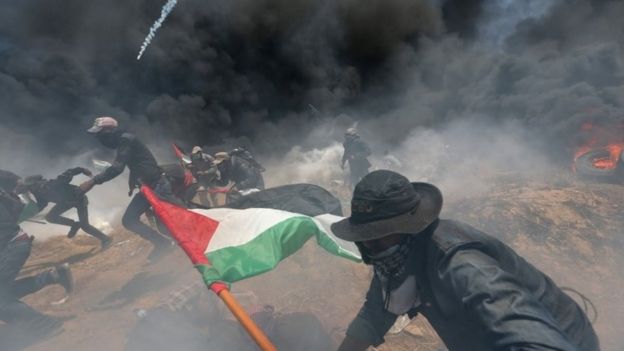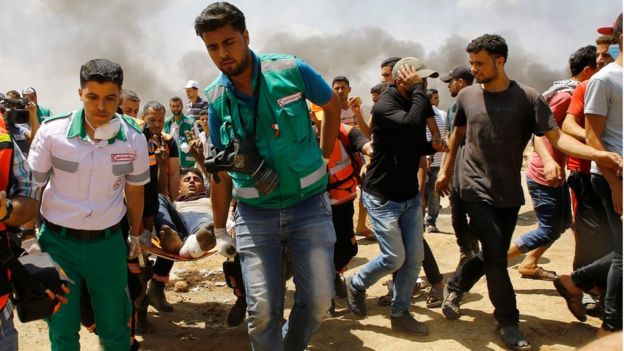Gaza clashes: Dozens killed as US opens Jerusalem embassy
Enable it in your browser or download Flash Player here.
Sorry, you need Flash to play this.
At least 41 Palestinians
have been killed and 1,800 wounded by Israeli troops in clashes on the
Gaza border, Palestinian officials say.
The violence came as the US opened its embassy in Jerusalem, a controversial move that has infuriated Palestinians.They see it as clear US backing for Israeli rule over the whole city, whose eastern part Palestinians lay claim to.
President Donald Trump told the opening ceremony via videolink the Jerusalem move had been a "long time coming".
He said: "Israel is a sovereign nation with the right to determine its own capital, but for many years we failed to recognise the obvious."
He also said the US remained "committed to facilitating a lasting peace agreement".
What has happened at the border?
Palestinians hurled stones and incendiary devices while the Israeli military used snipers, as black smoke poured from burning tyres.The Hamas-run health ministry said children were among those killed on Monday.
The mass demonstrations, led by Gaza's Islamist rulers, Hamas, are part of a six-week protest dubbed the "Great March of Return".

- Jerusalem: Trump move prompts negative world reaction
- Trumplomacy: Key takeaways from Jerusalem policy shift
The Israeli military said it had killed three people trying to plant explosives near the security fence in Rafah.
It said aircraft had also "targeted Hamas military posts near the Jabalia area after troops were fired upon".
There have also been violent clashes between Israeli police and protesters who raised Palestinian flags outside the new embassy. Several protesters were detained.
What led to the Gaza protests?
Palestinians have held weekly protests in the run-up to their annual commemoration of what they call the Nakba or Catastrophe, when hundreds of thousands of their people fled their homes or were displaced following the foundation of the Israeli state on 14 May 1948.Scores of Palestinians have been killed since the protests began. Thousands more have been wounded.
Hamas, which is in a state of conflict with Israel, had said it would step up protests in the lead-up to Tuesday, the official Nakba commemoration.

"Today is the big day when we will cross the fence and tell Israel and the world we will not accept being occupied forever," a science teacher in Gaza, Ali, told Reuters news agency.
What is being opened and who is attending?
A small interim embassy will start operating on Monday inside the existing US consulate building in Jerusalem.A larger site will be found later when the rest of the embassy moves from Tel Aviv.
Mr Trump's daughter, Ivanka, her husband Jared Kushner, who are both senior White House advisers, Treasury Secretary Steven Mnuchin and Deputy Secretary of State John Sullivan are at the ceremony.
After Ivanka Trump had unveiled the seal of the embassy, Mr Kushner said in his address: "When President Trump makes a promise he keeps it... We have shown the world that the US can be trusted. We stand with our friends and allies."
Mr Kushner also referred to Mr Trump's withdrawal from the "dangerous, flawed and one-sided Iran deal", drawing applause from the guests.
Israeli PM Benjamin Netanyahu said: "What a glorious day. Remember this moment. This is history. President Trump, by recognising history, you have made history. All of us are deeply grateful."
The decision to recognise Jerusalem as Israel's capital and move the embassy is strongly supported by Israeli Jews across the often fractious political spectrum.
Palestinian Authority President Mahmoud Abbas, however, has described Mr Trump's decision as the "slap of the century". He says the US can no longer be considered a neutral broker in on-off Israeli-Palestinian peace talks and cannot have any future role.
Why is the embassy move so controversial?
The status of Jerusalem goes to the heart of the Israeli-Palestinian conflict.- Israel and the Palestinians: Can settlement issue be solved?
- What are alternatives to a two-state solution?
Israel has occupied East Jerusalem since the 1967 Middle East war. It effectively annexed the sector, though this was not recognised by any countries until Mr Trump's declaration in December 2017.
Enable it in your browser or download Flash Player here.
Sorry, you need Flash to play this.
Various countries once had embassies based in Jerusalem but many moved after Israel passed a law in 1980 formally making Jerusalem its capital.
President Trump's decision last year to recognise Jerusalem as Israel's capital broke with decades of US neutrality on the issue and put it at odds with most of the international community.
A boost for Netanyahu
By Jeremy Bowen, BBC Middle East editor, JerusalemThe embassy move is the culmination of one of the best weeks in the political life of Israel's Prime Minister, Benjamin Netanyahu.
First President Trump kept his promise to pull out of the Iran nuclear deal. Now the US embassy is moving.
Placards in Jerusalem praise Mr Trump. The local football club, Beitar, infamous for fans who chant "death to Arabs", has included "Trump" in its name.
The embassy move has been rejected by the main allies of Israel and the US. Palestinians are protesting in their thousands in Gaza.
It is much more low-key in the West Bank, including occupied East Jerusalem.
The embassy move is good for the Netanyahu government, good for President Trump's base and makes most Israelis pleased but there is no evidence to back Mr Netanyahu's claim that it is good for peace.










Post a Comment